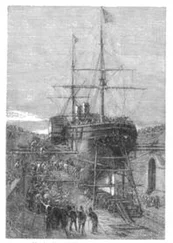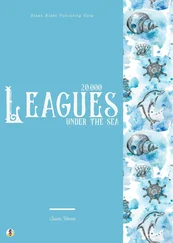Jules Verne - Twenty Thousand Leagues Under the Sea
Здесь есть возможность читать онлайн «Jules Verne - Twenty Thousand Leagues Under the Sea» — ознакомительный отрывок электронной книги совершенно бесплатно, а после прочтения отрывка купить полную версию. В некоторых случаях можно слушать аудио, скачать через торрент в формате fb2 и присутствует краткое содержание. Жанр: sf_writing, на английском языке. Описание произведения, (предисловие) а так же отзывы посетителей доступны на портале библиотеки ЛибКат.
- Название:Twenty Thousand Leagues Under the Sea
- Автор:
- Жанр:
- Год:неизвестен
- ISBN:нет данных
- Рейтинг книги:5 / 5. Голосов: 2
-
Избранное:Добавить в избранное
- Отзывы:
-
Ваша оценка:
- 100
- 1
- 2
- 3
- 4
- 5
Twenty Thousand Leagues Under the Sea: краткое содержание, описание и аннотация
Предлагаем к чтению аннотацию, описание, краткое содержание или предисловие (зависит от того, что написал сам автор книги «Twenty Thousand Leagues Under the Sea»). Если вы не нашли необходимую информацию о книге — напишите в комментариях, мы постараемся отыскать её.
Twenty Thousand Leagues Under the Sea — читать онлайн ознакомительный отрывок
Ниже представлен текст книги, разбитый по страницам. Система сохранения места последней прочитанной страницы, позволяет с удобством читать онлайн бесплатно книгу «Twenty Thousand Leagues Under the Sea», без необходимости каждый раз заново искать на чём Вы остановились. Поставьте закладку, и сможете в любой момент перейти на страницу, на которой закончили чтение.
Интервал:
Закладка:
For six months war was waged with various fortune in the leading articles of the Geographical Institution of Brazil, the Royal Academy of Science of Berlin, the British Association, the Smithsonian Institution of Washington, in the discussions of the "Indian Archipelago," of the Cosmos of the Abbe Moigno, in the Mittheilungen of Petermann, in the scientific chronicles of the great journals of France and other countries. The cheaper journals replied keenly and with inexhaustible zest. These satirical writers parodied a remark of Linn?us, quoted by the adversaries of the monster, maintaining that "nature did not make fools," and adjured their contemporaries not to give the lie to nature, by admitting the existence of krakens, sea-serpents, "Moby Dicks," and other lucubrations of delirious sailors. At length an article in a well-known satirical journal by a favorite contributor, the chief of the staff, settled the monster, like Hippolytus, giving it the death-blow amid a universal burst of laughter. Wit had conquered science.
During the first months of the year 1867, the question seemed buried never to revive, when new facts were brought before the public. It was then no longer a scientific problem to be solved, but a real danger seriously to be avoided. The question took quite another shape. The monster became a small island, a rock, a reef, but a reef of indefinite and shifting proportions.
On the 5th of March, 1867, the Moravian, of the Montreal Ocean Company, finding herself during the night in 27 30' lat. and 72 15' long., struck on her starboard quarter a rock, marked in no chart for that part of the sea. Under the combined efforts of the wind and its four hundred horsepower, it was going at the rate of thirteen knots. Had it not been for the superior strength of the hull of the Moravian, she would have been broken by the shock, and gone down with the 237 passengers she was bringing home from Canada.
The accident happened about five o'clock in the morning, as the day was breaking. The officers of the quarter-deck hurried to the after-part of the vessel. They examined the sea with the most scrupulous attention. They saw nothing but a strong eddy about three cables' length distant, as if the surface had been violently agitated. The bearings of the place were taken exactly, and the Moravian continued its route without apparent damage. Had it struck on a submerged rock, or on an enormous wreck? They could not tell; but on examination of the ship's bottom when undergoing repairs, it was found that part of her keel was broken.
This fact, so grave in itself, might perhaps have been forgotten like many others, if, three weeks after, it had not been re-enacted under similar circumstances. But, thanks to the nationality of the victim of the shock, thanks to the reputation of the company to which the vessel belonged, the circumstance became extensively circulated.
The 13th of April, 1867, the sea being beautiful, the breeze favorable, the Scotia, of the Cunard Company's line, found herself in 15 12' long. and 45 37' lat. She was going at the speed of thirteen knots and a half.
At seventeen minutes past four in the afternoon, while the passengers were assembled at lunch in the great saloon, a slight shock was felt on the hull of the Scotia, on her quarter, a little aft of the port paddle.
The Scotia had not struck, but she had been struck, and seemingly by something rather sharp and penetrating than blunt. The shock had been so light that no one had been alarmed, had it not been for the shouts of the carpenter's watch, who rushed on to the bridge, exclaiming, "We are sinking! We are sinking!" At first the passengers were much frightened, but Captain Anderson hastened to reassure them. The danger could not be imminent. The Scotia, divided into seven compartments by strong partitions, could brave with impunity any leak. Captain Anderson went down immediately into the hold. He found that the sea was pouring into the fifth compartment; and the rapidity of the influx proved that the force of the water was considerable. Fortunately this compartment did not hold the boilers, or the fires would have been immediately extinguished. Captain Anderson ordered the engines to be stopped at once, and one of the men went down to ascertain the extent of the injury. Some minutes afterward they discovered the existence of a large hole, of two yards in diameter, in the ship's bottom. Such a leak could not be stopped; and the Scotia, her paddles half submerged, was obliged to continue her course. She was then three hundred miles from Cape Clear, and after three days' delay, which caused great uneasiness in Liverpool, she entered the basin of the company.
The engineers visited the Scotia, which was put in dry-dock. They could scarcely believe it possible; at two yards and a half below water-mark was a regular rent, in the form of an isosceles triangle. The broken place in the iron plates was so perfectly defined that it could not have been more neatly done by a punch. It was clear, then, that the instrument producing the perforation was not of a common stamp; and after having been driven with prodigious strength, and piercing an iron plate one and three- eighth inches thick, had withdrawn itself by a retrograde motion truly inexplicable.
Such was the last fact, which resulted in exciting once more the torrent of public opinion. From this moment all unlucky casualties which could not be otherwise accounted for were put down to the monster.
Upon this imaginary creature rested the responsibility of all these shipwrecks, which unfortunately were considerable; for of three thousand ships whose loss was annually recorded at Lloyd's, the number of sailing and steamships supposed to be totally lost, from the absence of all news, amounted to not less than two hundred.
Now, it was the "monster" who, justly or unjustly, was accused of their disappearance, and, thanks to it, communication between the different continents became more and more dangerous. The public demanded peremptorily that the seas should at any price be relieved from this formidable cetacean.
| Go to Contents |
At the period when these events took place, I had just returned from a scientific research in the disagreeable territory of Nebraska, in the United States. In virtue of my office as Assistant Professor in the Museum of Natural History in Paris, the French government had attached me to that expedition. After six months in Nebraska, I arrived in New York toward the end of March, laden with a precious collection. My departure for France was fixed for the first days in May. Meanwhile, I was occupying myself in classifying my mineralogical, botanical, and zoological riches, when the accident happened to the Scotia.
I was perfectly up in the subject which was the question of the day. How could I be otherwise? I had read and reread all the American and European papers without being any nearer a conclusion. This mystery puzzled me. Under the impossibility of forming an opinion, I jumped from one extreme to the other. That there really was something could not be doubted, and the incredulous were invited to put their finger on the wound of the Scotia.
On my arrival at New York, the question was at its height. The hypothesis of the floating island, and the unapproachable sand-bank, supported by minds little competent to form a judgment, was abandoned. And, indeed, unless this shoal had a machine in its stomach, how could it change its position with such astonishing rapidity?
From the same cause, the idea of a floating hull of an enormous wreck was given up.
There remained then only two possible solutions of the question, which created two distinct parties: on one side, those who were for a monster of colossal strength; on the other, those who were for a submarine vessel of enormous motive power.
Читать дальшеИнтервал:
Закладка:
Похожие книги на «Twenty Thousand Leagues Under the Sea»
Представляем Вашему вниманию похожие книги на «Twenty Thousand Leagues Under the Sea» списком для выбора. Мы отобрали схожую по названию и смыслу литературу в надежде предоставить читателям больше вариантов отыскать новые, интересные, ещё непрочитанные произведения.
Обсуждение, отзывы о книге «Twenty Thousand Leagues Under the Sea» и просто собственные мнения читателей. Оставьте ваши комментарии, напишите, что Вы думаете о произведении, его смысле или главных героях. Укажите что конкретно понравилось, а что нет, и почему Вы так считаете.












